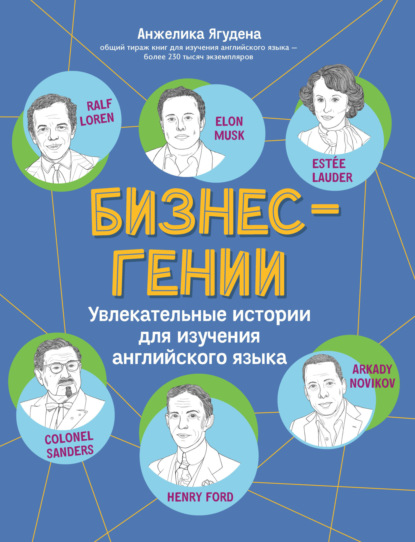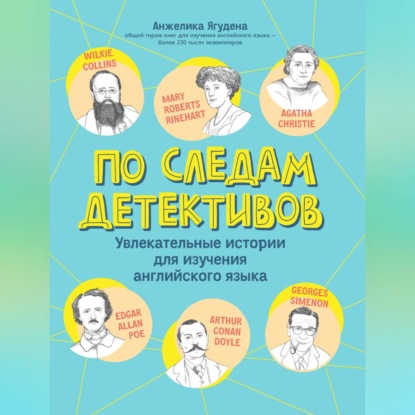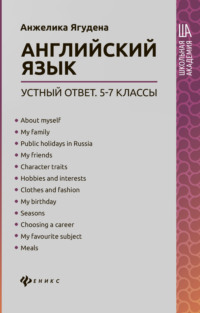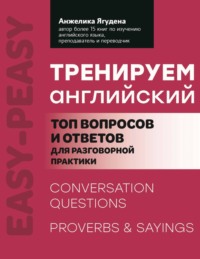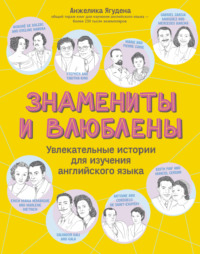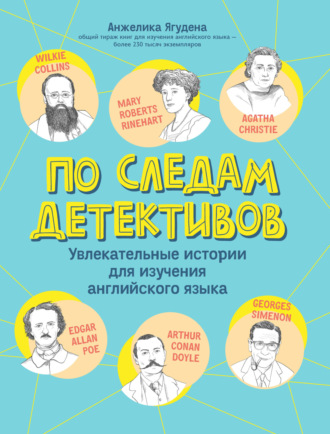
Полная версия
По следам детективов: увлекательные истории для изучения английского языка

Анжелика Ягудена
По следам детективов: увлекательные истории для изучения английского языка
© Ягудена А., текст, 2024
© Ибрагимова А., иллюстрации, 2024
© ООО «Феникс», оформление, 2024
© В оформлении обложки использованы иллюстрации по лицензии Shutterstock.com
* * *
Introduction
Дорогие читатели, предлагаю вам окунуться в увлекательный мир тайн, загадок и расследований. Перед вами книга, которая познакомит вас с занимательными фактами биографии легендарных писателей детективного жанра и приоткроет завесу тайны над их творческой и личной жизнью. Если вы хотите почувствовать себя настоящим детективом, а заодно эффективно улучшить разговорные навыки английского языка и расширить свой словарный запас, то можно принять участие в расследовании запутанных преступлений. Подобно знаменитым сыщикам, чтобы выйти на след преступника, вы будете искать подозреваемых, проверять их алиби и собирать улики. Эта книга поможет не только узнать много нового о гениях детективного жанра, но также с помощью игровых методов увлекательно и интересно развить внимательность к деталям и логическое мышление. Вам не придется монотонно заучивать материал. Напротив, можно совместить приятное с полезным: прикоснуться к жизни и творчеству гениев, а затем, вдохновившись, с удовольствием приступить к отработке основных навыков владения английским языком. У вас также будет возможность обсудить книги, которые произвели на вас впечатление, и поделиться своими эмоциями.
Книга рассматривает интересные факты из жизни непревзойденных мастеров детективного жанра, таких как Артур Конан Дойл, Агата Кристи, Эдгар Аллан По, Жорж Сименон, Уилки Коллинз и Мэри Робертс Райнхарт. Все биографии сопровождаются актуальной лексикой и заданиями на понимание смысла прочитанного, расширение словарного запаса и развитие коммуникативных навыков. Главной изюминкой книги являются детективные загадки на логику, для решения которых понадобится не просто понять смысл написанного, но также проанализировать все мотивы и факты, чтобы раскрыть запутанное дело. В конце книги есть переводы (не дословные, но полно передающие смысл) текстов и ключи к упражнениям, которые помогут проверить себя без помощи преподавателя. Любители цитат и афоризмов оценят подборку мудрых высказываний великих писателей.
Многие задания этого издания посвящены обсуждению произведений. Чтобы поделиться своими впечатлениями или написать отзыв о прочитанной книге, ознакомьтесь с наиболее популярными и полезными выражениями.
● The book is narrated by… / История ведется от лица…
● The events take place in… / Действие книги происходит в…
● The main characters of the book are… / Главными героями книги являются…
● The book is titled… / Книга носит название…
● This book is a real page-turner! / От этой книги невозможно оторваться!
● This book is exactly what I’ve been looking for! / Это именно та книга, которую я искал!
● This book captured my imagination like nothing before. / Эта книга захватила мое воображение, как ни одна другая до этого.
● It kept me intrigued from start to end. / Эта книга интригует с первых страниц и до самого конца.
● The book is fast-paced. / Повествование в книге развивается стремительно.
● I really loved an unexpected twist in the story. / Мне безумно понравился неожиданный поворот сюжета.
● The book is worth reading. / Эту книгу стоит прочитать.
● The ending was a tear-jerker. / Концовка книги тронула меня до слез.
● The plot of the story is simple. / Сюжет книги незамысловат.
● informative – информативный, содержательный;
● thought-provoking – наводящий на размышления;
● breathtaking – захватывающий дух;
● easy to read – легкий для чтения;
● amusing – забавный;
● exciting – увлекательный;
● boring – скучный;
● predictable – предсказуемый;
● hard to read – сложный для чтения.
Для решения головоломок (brain-teasers) и раскрытия запутанных преступлений понадобятся следующие полезные слова и выражения.
● Motive for the crime – мотив преступления: She has no motive for the crime. У нее нет мотива преступления.
● To commit a crime – совершить преступление: I’ve figured out who committed a crime. Я выяснила, кто совершил преступление.
● Crime scene – место преступления: The police arrived at the crime scene. Полиция прибыла на место преступления.
● To solve the crime – раскрыть преступление: We have half an hour to solve the crime. У нас есть полчаса, чтобы раскрыть преступление.
● To have an alibi – иметь алиби: Each of them has an alibi. У каждого из них есть алиби.
● To search for clues/evidence – искать улики: I searched far and wide for clues. Я искала улики повсюду.
● To interrogate – проводить допрос, опрашивать: Detective Williams interrogated the suspects. Мистер Уильямс опросил всех подозреваемых.
● The main suspect – главный подозреваемый: Mr. Johnson is our main suspect. Мистер Джонсон – наш главный подозреваемый.
● Disinterested party – незаинтересованная сторона: Mr. Smith is a disinterested party. Мистер Смит – незаинтересованная сторона.
● To be guilty/innocent – быть виновным/невиновным: He is guilty. Он виновен.
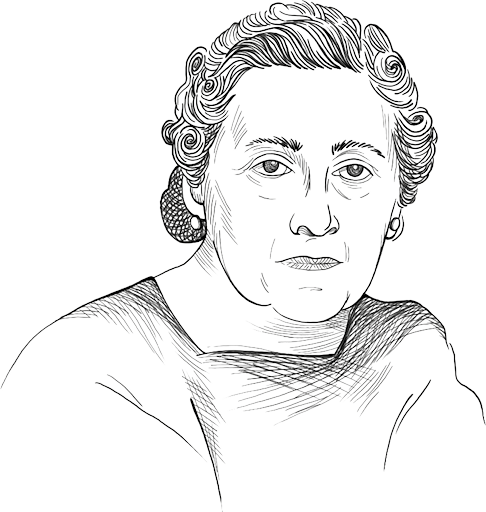
Agatha Christie
“Every family has a skeleton in the cupboard,” as the English say. This famous proverb means that everyone has their own secrets, hidden away from view. The unknown is always intriguing and beckoning. Anyway, we are eager to know the truth that others want to hide. That is how the world really works. Obviously, the secret lives of legendary people seem even more exciting and interesting. As for Agatha Christie, her life itself looked more like an action-packed detective story with an unpredictable ending.
Every school kid can tell you who Agatha Christie was, but not everyone knows her secrets. In fact, her life was filled with mysteries. Admirers of Christie’s talent are still puzzling over her mysterious disappearance that shocked the world. Just imagine: police are desperately searching for a missing woman who left her daughter with her nanny and vanished in suspicious circumstances. The next day, her car is found abandoned, about an hour’s drive from home. And what about the main character? She seems to have vanished into thin air, and nobody knows where to find her. Meanwhile, the missing woman is enjoying her stay at the hotel in Yorkshire. Does this episode ring a bell to you? It sounds like a plot of a mystery story, right? Yet, this is the real-life story of the iconic writer Agatha Christie. So, what happened back then? This chapter tells a fascinating story of a woman who became one of the greatest writers of all time, while also lifting the veil on her extremely private life. You’ll find out some lesser-known facts that will probably surprise you.
Agatha Christie is the unsurpassed “Queen of Crime” and one of the world’s best-selling novelists. Her books are outsold only by the Bible and the works of Shakespeare. In her career, Agatha Christie wrote sixty-six mystery novels under her own name and another six under the pen name Mary Westmacott. She also published a number of short story collections, numerous plays, and an autobiography. Among her most famous books are Murder on the Orient Express, The Mysterious Affair at Styles, The ABC Murders, Death on the Nile, and many others. And it’s no secret that Agatha created iconic characters – Hercule Poirot and Miss Marple.
Agatha Mary Clarissa Miller was born on September 15, 1890, in Torquay, a seaside town in south-western England. She was the youngest of three children born to Frederick and Clarissa Miller. Agatha had two older siblings named Margaret and Louis. Curiously, little Agatha never went to school and was educated at home. Since early childhood, she loved books, and by the age of five, she taught herself to read. Little Agatha had a rich imagination. As a child she invented imaginary friends and began writing poems. When she was eleven, her beloved father died of a heart attack. This terrible misfortune came out of the blue. In addition to financial hardships, Agatha had to become a support for her mom, who grieved the loss of her loved one. They managed to overcome all life’s challenges, and over time Agatha took piano and singing lessons. She could have become a great pianist, but her natural shyness and stage fright prevented her from pursuing a career in music.
It was in 1912, when Agatha met her first husband Archibald Christie, a military officer in the Royal Flying Corps. They got married two years later, on Christmas Eve 1914. With the outbreak of the First World War, the married couple was forced to live apart: Agatha remained in her hometown Torquay and worked as a nurse in a Red Cross hospital, while Archie went to France. Over time, Agatha became an assistant pharmacist in a hospital, where she learned much about poisons. It was precisely this fact that left an imprint on her work: poison is among fiction’s most popular murder weapons.
Her first novel The Mysterious Affair at Styles, Agatha wrote in 1916 and dedicated it to her mother Clarissa. It introduced Hercule Poirot, the eccentric and brilliant detective. However, the journey to publishing this book was a long one. After being turned down by numerous publishers, Agatha Christie published her debut novel only in 1920.
As the years went on, the relationship between Agatha and her husband hit a dead end. Shortly after the birth of their daughter Rosalind, the couple grew significantly apart. One day, on return from his business trip, her husband Archie announced that he had fallen in love with another girl named Nancy Neele. As it turned out, Nancy, unlike Agatha, shared his passion for golf. This news was a terrible blow for the writer. In fact, she loved her husband all those years and waited for him to come back from the war. Her whole world collapsed overnight, and she felt totally devastated. For a while, they tried to save their marriage, especially for their daughter’s sake. However, as the saying goes, “A cracked bell can never sound well.” One day, after a fierce argument, Archie left their house. The harsh reality was that he was going to divorce her. Later she would write in her memoirs, “I suppose, with those words, that part of my life – my happy, successful, confident life – ended.” Actually, separation is always a painful and heartbreaking experience, and everyone reacts differently to breaking up. As it turned out, Agatha Christie was vulnerable and sensitive, yet very strong. So, what do you think happened next? Fiction suddenly became reality: Agatha vanished without a trace.
The mysterious disappearance of Agatha Christie haunts our minds and imagination to this very day. This intrigue deserves an Oscar. So, what happened that night? According to her biographer, before disappearance Agatha Christie wrote a letter to her secretary Carlo Fisher, asking to cancel the hotel reservation in Yorkshire. She also sent letters to her husband Archie and his brother Campbell. Naturally, the question arises: was it all made up? Perhaps, the “Queen of Crime” was preparing her escape plan. However, let’s not get ahead of ourselves! Agatha kissed her little daughter goodnight and drove off.
The next morning, her car and personal belongings were found abandoned. Agatha Christie’s disappearance caused a great public outcry. There was huge speculation over the causes of this mysterious disappearance. Many predicted the worst-case scenario. The media suspected that Agatha Christie had been kidnapped. Some suggested that her husband Archie was involved in this disappearance, others suggested that she drowned herself. There was also speculation that Agatha took revenge on her husband. According to another version, it was a cunning ploy: she staged the entire disappearance to attract more audience to her new book.
This was one of the biggest country’s manhunts: more than a thousand police officers, up to 15,000 volunteers, and even her beloved dog searched for the missing writer. On top of that, two other famous writers – Sir Arthur Conan Doyle and Dorothy Sayers – joined in the search.
Agatha Christie had been missing for eleven days. She was found, safe and well, in Harrogate, Yorkshire. It turned out that she had checked into the hotel under the surname of “Neele,” the last name of Archie’s lady friend,which complicated the search. Agatha Christie didn’t comment on what had happened, claiming loss of memory. Doctors suggested she suffered a nervous breakdown. It’s still unclear whether her loss of memory was staged or caused by stress. Curiously, she didn’t recognize her husband Archie when he came to visit her. Agatha Christie never discussed the circumstances of her disappearance in detail, even with family or friends.
Anyway, the investigation came to a dead end. Amazingly, the mystery still remains unsolved, and we are left with more questions than answers. Who knows, maybe Agatha Christie wanted to let people finish the story for her.
Agatha and Archie split up. The divorce was tough on her. It took a while to cope with painful emotions and move on. Two years after divorcing Archie, Agatha married the archeologist Max Mallowan and joined him for regular expeditions to Iraq and Syria. I guess they bonded over the passion for traveling. Despite the difference in age – Agatha was fourteen years older than her husband – it was a happy marriage.
Agatha Christie was a very private person. And the more famous the writer became, the more she shunned publicity. Even so, she was full of life! Agatha would say, “I have sometimes been wildly despairing, acutely miserable, racked with sorrow, but through it all I still know quite certainly that just to be alive is a grand thing.” As I see it, Agatha Christie was a true adventure seeker. Her wanderlust and spirit of adventure encouraged Agatha and her husband to go on a round-the-world trip for ten months.
Agatha Christie died on January 12, 1976, at age 85, but she will forever remain in the hearts of her devoted readers.
Vocabulary
every family has a skeleton in the cupboard [ˈevrɪ ˈfæm(ə)lɪ hæz ə ˈskelɪtn ɪn ðiː ˈkʌbəd] – в каждой семье есть свои скелеты в шкафу
be eager [bi ˈiːgə] – жаждать, очень хотеть, стремиться что-либо сделать
action-packed [ˈækʃn pækt] – остросюжетный
puzzle over [pʌzl ˈəʊvə] – ломать голову над чем-то
go missing [gəʊ ˈmɪsɪŋ] – пропасть без вести
missing person [ˈmɪsɪŋ pɜːsn] – пропавший без вести
suspicious [səˈspɪʃəs] – подозрительный, сомнительный
ring a bell [rɪŋ ə bel] – быть знакомым, напоминать о чем-то/ком-то (идиома)
vanish/disappear [ˈvænɪʃ ˌdɪsəˈpɪə] – исчезнуть
without a trace [wɪˈðaʊt ə treɪs] – бесследно
lift the veil [lɪft ðiː veɪl] – приоткрыть завесу
unsurpassed [ˌʌnsərˈpæst] – непревзойденный
be outsold (by) [bi autˈsəuld bai] – иметь меньший спрос, чем что-либо другое
best-selling novelist [ˌbestˈselɪŋ ˈnɑːvəlɪst] – автор бестселлеров, самый продаваемый писатель
novelist [ˈnɑːvəlɪst] – романист, писатель
novel [ˈnɑːvl] – роман
mystery novel [ˈmɪstərɪ ˈnɑːvl] – детектив, детективный роман
detective story [dɪˈtektɪv ˈstɔːrɪ] – детектив, детективный роман
play [pleɪ] – спектакль, пьеса
autobiography [ˌɔːtəbaɪˈɑːɡrəfi] – автобиография
short story collection [ʃɔːt ˈstɔːrɪ kəˈlekʃn] – сборник коротких рассказов
pen name [pen neɪm] – литературный псевдоним
maiden name [meɪdn neɪm] – девичья фамилия
publish [ˈpʌblɪʃ] – публиковать
thrilling [ˈθrɪlɪŋ] – захватывающий, остросюжетный, увлекательный
iconic character [aɪˈkɑːnɪk ˈkærəktə] – культовый, легендарный персонаж
interestingly [ˈɪntrestɪŋli] – любопытно, примечательно
curiously [ˈkjʊərɪəslɪ] – любопытно, как ни странно
obviously [ˈɑːbviəsli] – очевидно, по-видимому
misfortune [mɪsˈfɔːʧən] – несчастье, беда, горе
out of the blue [aʊt əv ðiː bluː] – совершенно неожиданно, как гром среди ясного неба
financial hardship [fæɪˈnænʃ(ə)l ˈhɑːdʃɪp] – финансовые трудности
grieve the loss [griːv ðiː lɔːs] – переживать утрату
overcome challenges [əʊvəˈkʌm ˈʧælənʤɪz] – преодолевать трудности
stage fright [steɪʤ fraɪt] – боязнь сцены
pursue a career [pəˈsjuː ə kəˈrɪə] – построить карьеру
live apart [lɪv əˈpɑːt] – жить раздельно
remain [rɪˈmeɪn] – оставаться
poison [ˈpɔɪzn] – яд
leave an imprint (on) [liːv æn ɪmˈprɪnt ɑːn] – оставить след, отпечаток
dedicate [ˈdedɪkeɪt] – посвящать, предназначать
hit a dead end [hɪt ə ded end] – заходить в тупик
grow apart [grəʊ əˈpɑːt] – отдаляться друг от друга
as it turned out [æz ɪt tɜːnd aʊt] – как оказалось, выяснилось
overnight [ˌəʊvəˈnaɪt] – в одночасье, неожиданно, мгновенно
devastated [ˈdevəsteɪtɪd] – опустошенный, подавленный
separation [ˌsepəˈreɪʃn] – разлука, расставание
breaking up [ˈbreɪkɪŋ ʌp] – расставание, разрыв
split up [splɪt ʌp] – расставаться, расходиться
divorce [dɪˈvɔːs] – развестись
vulnerable [ˈvʌlnərəbl] – уязвимый, беззащитный
kiss goodnight [kɪs ˌɡʊdˈnaɪt] – поцеловать кого-то на ночь, перед сном
personal belongings [ˈpɜːsənl bɪˈlɔːŋɪŋz] – личные вещи
speculation [spekjʊˈleɪʃn] – предположение, домысел, догадка
worst-case scenario [wɜːst keɪs səˈnæriəʊ] – наихудший сценарий
kidnap [ˈkɪdnæp] – похищать
take revenge (on) [teɪk rɪˈvenʤ ɑːn] – отомстить, взять реванш
cunning ploy [ˈkʌnɪŋ plɔɪ] – хитрый ход
stage [steɪʤ] – инсценировать
manhunt [ˈmænhʌnt] – преследование, розыск
cause a public outcry [kɔːz ə ˈpʌblɪk ˈaʊtkraɪ] – вызывать общественный резонанс
nervous breakdown [ˈnɜːvəs ˈbreɪkdaʊn] – нервный срыв
loss of memory [lɔːs əv ˈmemərɪ] – потеря памяти
bond over [bɑːnd ˈəʊvə] – сходиться, сближаться на почве
passion for traveling [pæʃn fɔː ˈtrævəlɪŋ] – страсть к путешествиям
wanderlust [ˈwɑːndəlʌst] – страсть к путешествиям
adventure seeker [ədˈvenʧə ˈsiːkə] – искатель приключений
Exercises
Exercise 1. Answer the following questions:
1) What does the English proverb “Every family has a skeleton in the cupboard” mean?
2) When and where was Agatha Christie born?
3) What was her maiden name?
4) Did Agatha have any siblings?
5) How many books did Agatha Christie write?
6) What famous fictional characters did Agatha Christie create?
7) What kind of education did she get?
8) At what age did Agatha Christie learn to read?
9) What did she like doing in her free time as a child?
10) What prevented Agatha from pursuing a career in music?
11) What was her first husband’s name?
12) What did Agatha Christie do during World War I?
13) When was her debut novel published? How much time did it take her to find a publisher?
14) Who did Agatha Christie dedicate her first book to?
15) Did Agatha have any children?
16) What caused her mysterious disappearance?
17) Were there any versions of what had happened?
18) How long had Agatha been missing before she was found?
19) Where was she found?
20) What name was the reservation under?
21) Did she give an explanation of her disappearance?
22) What did doctors say about her condition?
23) In your opinion, what was the main reason for her disappearance?
24) How long did it take her to get over a divorce?
25) What was her second husband’s name?
26) What was his profession?
27) In your opinion, what kind of person was Agatha Christie?
28) Have you ever read any books by Agatha Christie? What is your opinion on it?
29) What book have you recently read that really impressed you?
30) What kind of books do you like to read?
Exercise 2. Find the equivalents of the following words and phrases in the text:
остросюжетный детектив с непредсказуемой развязкой; инсценировать собственное исчезновение; непревзойденная королева детективного жанра; сборник коротких рассказов; культовый персонаж; горячо любимый отец; воображаемые друзья; переживать утрату; как гром среди ясного неба; жить в разлуке; отношения зашли в тупик; таинственное исчезновение; целая и невредимая; справиться с болезненными эмоциями; страсть к путешествиям; исчезновение вызвало большой общественный резонанс; так устроен мир; они отдалились друг от друга; брать уроки фортепиано и пения; менее известные факты; ломать голову; ходили слухи; отомстить мужу; зарегистрироваться в гостинице
Exercise 3. Give the Russian equivalents of the following words and phrases:
the world’s best-selling novelist; a cunning ploy; to go on a round-the-world trip; a true adventure seeker; to overcome all life’s challenges; over time; to vanish without a trace in suspicious circumstances; an hour’s ride from home; financial hardships; to pursue a career in music; a private person; to move on; siblings; to leave an imprint (on); a fierce argument; to be home schooled; to check into a hotel; military officer; natural shyness; to have a rich imagination; the world collapsed overnight; to prepare an escape plan; to come to a dead end; personal belongings
Exercise 4. Match the words with their definitions:
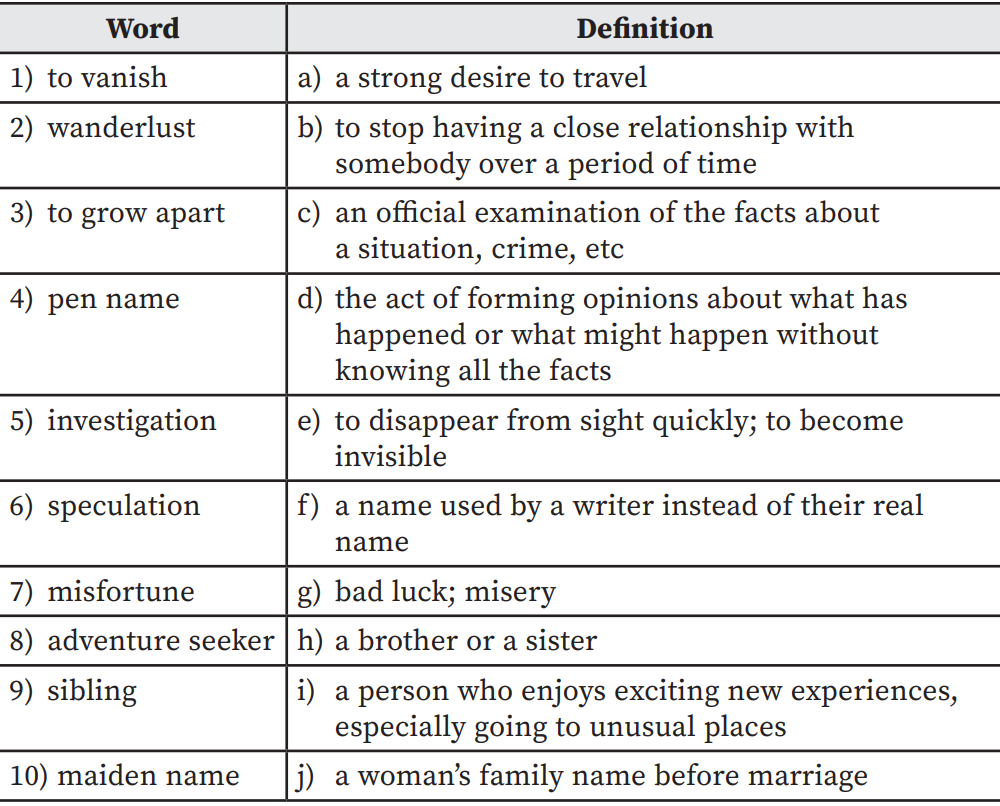
Detective Riddle No. 1
Have you ever dreamed of becoming a detective? If so, let’s see if you have the ability to be one. Read the story carefully and collect all the clues that lead to the suspect. Find all the information needed to solve the mystery.
● Collect the evidence, check out alibis and interrogate each suspect to solve the crime.
● Possible suspects: Mr. Johnson, Ann, Pam, Nick, Cindy.
Ms. Smith, an English teacher, got to school a few minutes before the beginning of the lesson. She came across her colleague Mr. Johnson, in the entrance hall, and they had a small talk. She put her handbag and the classroom key on the table and answered the phone. Three of her students (Ann, Pam, and Nick) were standing nearby. Then Ms. Smith checked her email on her smartphone. There was a message from her student Cindy with a request. The girl explained her reason for not attending school. Then Ms. Smith looked at her watch and hurried to the classroom. The class test was scheduled to start in five minutes.
When Ms. Smith got there, she started feeling that something was wrong. The door was locked, and the students were waiting outside. Ann was helping her classmate with his homework. She was a straight A student and was always ready for school. Pam was playing games on her mobile. She was standing by herself, which was unusual for her. Pam wasn’t too nervous because she had prepared for the test the day before. Nick looked upset or puzzled. He did poorly at school and lagged behind his classmates. Yesterday, his mom got a letter from the headmaster about his poor school attendance.




